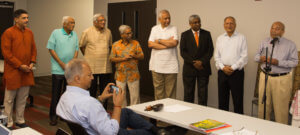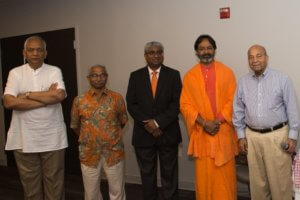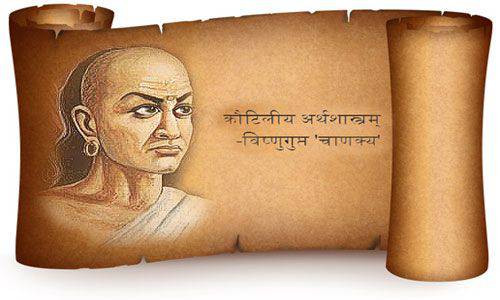
Kautilya’s Arthasastra
Written around 300 BC, is a text on statecraft, a book of political realism. It deals with various topics including war and diplomacy, how a king can retain his kingdom and become a conqueror, how to make allies and know the enemies, and how to make treaties. It focuses on elements, what can be termed in modern usage diplomacy, such as the doctrine of a silent war, propaganda, secret agents, how to use women as weapons of war, and how to use religion and superstition to advantage.
According to Kautilya, “power is (possession of) strength” and “strength changes the mind.” More importantly, Kautilya emphasized power to control not only outward behavior but also the thoughts of one’s subjects and enemies. According to him, “one possessed of personal qualities, though ruling over a small territory … conversant with (the science of) politics, does conquer the entire earth, never loses.” Kautilya is the founder of Mandala Theory of foreign policy, which can be termed as a precursor of the theories of political realism and balance of power. Kautilya favored righteous war than greedy and demoniacal wars.
The course will delve into various elements of this insightful text and juxtapose the main ideas in the text with similar theories and approaches in the modern world. The students will be able to draw parallels between the core ideas embedded in this ancient text with many modern ideas.
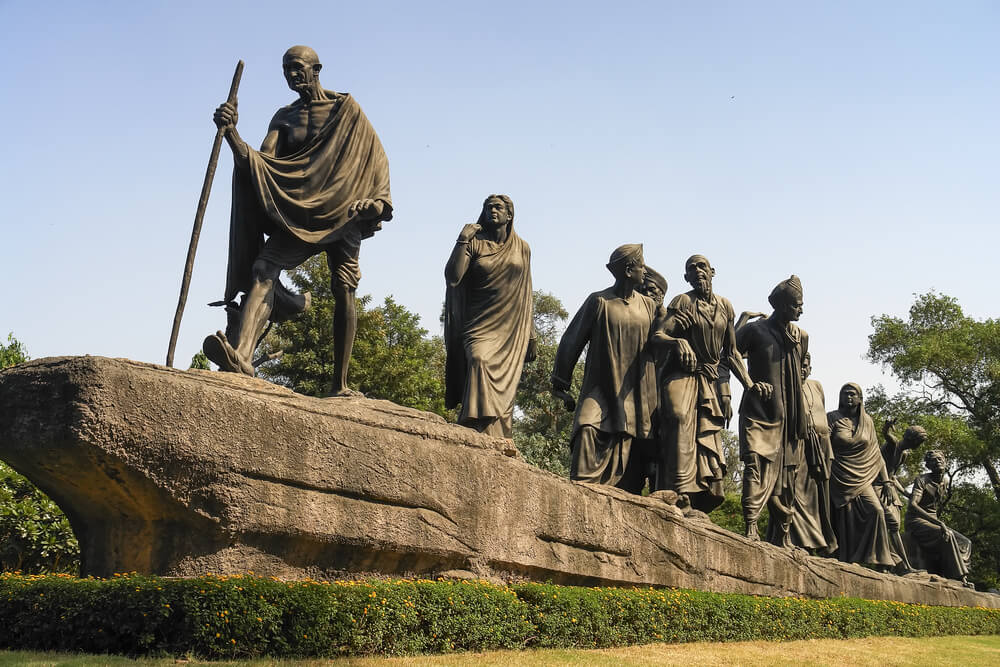
Gandhian Philosophy
Course Description
The relevance of Mahatma Gandhi for the contemporary world, characterized by turbulence, is indisputable. Gandhi’s principles of Ahimsa (non-violence) and Satyagraha (love for the truth) stemmed from his religious tradition, and he applied these principles to political action in South Africa and India. Gandhian ideas such as frugal economy, Gram Swaraj (grass-roots democracy), Ram Rajya (ideal state), trusteeship, social service, Swadeshi (self-reliance), bread-labor, social and religious harmony, and optimal use of resources will also be explored in the course.
The course, while evaluating Gandhian perspective on conflict resolution and peacebuilding, critically examines ideas of Gandhi in academic and policy debates towards the development of rich and multiple perspectives and pathways to address the gap between principles and practice. It also proposes Gandhian solutions to contemporary global issues including, but not limited to, inter-state and intra-state conflicts, climate change, religious extremism, rich-poor divide, education, economic development, and women empowerment.
The students taking this course will apply a Gandhian perspective on the prevailing discourses on human life and society and appreciate the significance of dialogue among civilizations and cultures.

Hinduism and Conflict Resolution
Course Description
Though there is a vast literature on conflict and peace studies, the Hindu ideas are seldom factored in the discipline. The Hinduism and conflict resolution course aims to fill this gap while dispelling myths about Hindu ideas on conflict resolution. A closer examination reveals that Hindu thought from the very ancient era dealt with conflict at multiple levels and explored pathways for their transformation.
A hallmark of the Hindu thought is its spiritual approach to conflict and its emphasis on the interlinkage of conflicts at various spheres including psychological, social, cultural, political, and economic. Whether it was the dialogue between Krishna and Arjuna in the battlefield of Kurukshetra or Kautilya’s famous exhortation to Indians to unite against invading Greeks, or Ashoka’s remorse during the Kalinga war or Gandhi’s struggle against the British rule, they reveal to us powerful ideas and their relevance for a discourse on conflict resolution and peacebuilding.
While introducing students the core elements of the Hindu thought on conflict and peace, the course explores their conflict resolution potentials. Students will examine an ongoing conflict, while exploring Hinduism and conflict resolution.

Course Description
Though its origin could be traced to the ancient and medieval periods, human rights as a concept and policy instrument became popular in the 20th century, particularly after the promulgation of the Universal Declaration of Human Rights by the United Nations in 1948. There are many scholarly studies on the subject, but most of them adopt a Eurocentric approach. Scarcely there are studies which bring into focus a Vedanta perspective on the subject.
The concept of practical Vedanta, popularized by Swami Vivekananda in the late 19th century, could be considered a precursor to the idea of human rights. Vedanta philosophy, Swami Vivekananda argued, has no value unless it addresses everyday problems confronted by human society including the exploitation of the weak, discrimination against women, and problems like poverty and illiteracy.
He argued that for universal peace it is necessary that individuals come out of their selfish boundaries and think of the world as one family (Vasudhaiva Kutumbakam). The course through its various modules emphasizes that Vedanta perspective with its deep philosophical and practical underpinnings is relevant for human rights policy and practice.

International Politics: A Vedanta Perspective
Course Description
How does a Vedanta perspective widen our understanding of the current predicaments, and help us explore solutions to them? While exploring solutions to international conflicts, the Vedanta perspective goes beyond surface dimensions of conflicts. For example, Vedanta philosopher Sri Aurobindo argued, like individuals, states have egos– amplified through national habits, prejudices, and idiosyncrasies.
When applied to international politics, they lead to jingoism, exploitation, and wars, leading to practices like colonialism and imperialism. Colonialism and imperialism were only manifestations of an exploitative substructure. Though colonialism and imperialism belong to the past, the root, the ego, is intact, and its manifestation has acquired new shapes. The Vedanta perspective would also argue that state ego is not static, and it can evolve when state leaders think in terms of human unity and factor that thinking into policymaking.
The establishment of the United Nations, after the failure of the League of Nations, was hailed a right step in this direction. The UN was established with a promise to ensure dignity and equality to all states. Has this happened? The course explores all these dimensions while mainstreaming the Vedanta perspective and aims to design a Vedanta approach to international politics.

Introduction to Conflict and Peace Studies
Conflicts are omnipresent in human relations. They are neither inherently good nor bad, but simply facts of life. A conflict situation arises when individuals or groups pursuit incompatible goals. These competing goals can range from needs within the family to competition over scarce resources between members of a community or between states. When competition turns violent, conflict resolution becomes essential as the costs rise with short term and long term implications. This course introduces some of the leading theories of conflict and conflict resolution.
The goals of this course are threefold: to introduce students to the background and characteristics of conflict and peace studies; to explore a multitude of tools and explanations used by scholars in order to understand peace and conflict; and, to encourage students to explore a complex and interesting subject in an innovative manner through drawing from the existing theories.
The course begins with an introduction to conflict theories, focusing on various ways to approach conflict. It also focuses on the conflict at various levels – individual, group, intra-state, and interstate. The course then focuses on various approaches to conflict management and conflict resolution.
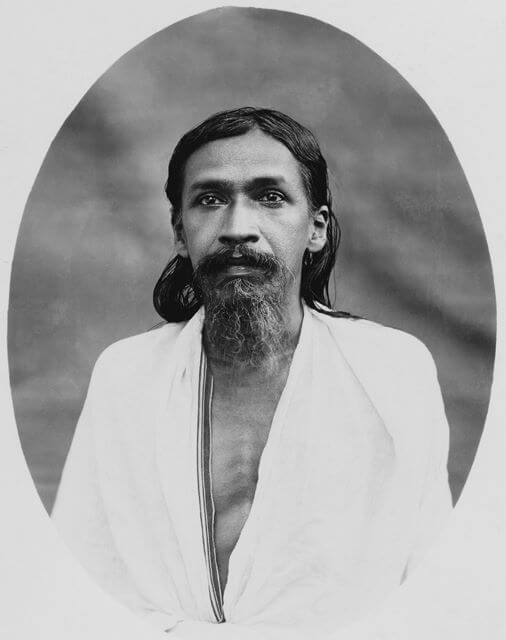
Philosophy of Sri Aurobindo
Course Description
Indian philosopher, poet, mystic and Yogi, Sri Aurobindo (1872-1950), argued that human society has evolved throughout history. His aphorism ‘All Life is Yoga’ is in consonance with his evolutionary philosophy. His Integral Yoga encompasses every aspect of human life and society, and according to which the onward march of which do not stop at the present transitory formations. Sri Aurobindo did not deny the relevance of the transitory formations but emphasized that they have to be transcended as they are not the summit in the evolution.
Following Advaita Vedanta, he believed that there is a fundamental unity as the basis of existence and at the foundation of all things, and it is the Nature that moves to realize this unity. He described the Upanishads, the waning or lost knowledge recovered by Rishis through “meditation and spiritual experience” or recovery of the old truths in new forms by Rishis who used the Vedic Word as “a seed of thought and vision.” He expressed dissatisfaction that the modern individual, busy with his mundane life and outward activities, has lost interest in this ancient wisdom.
The course would critically examine relevant aspects of Sri Aurobindo’s philosophy and its applicability to contemporary problems. Despite the profundity of his philosophy and its wider implications, Sri Aurobindo and his ideas are relatively less explored. The course aims to fill this gap.







